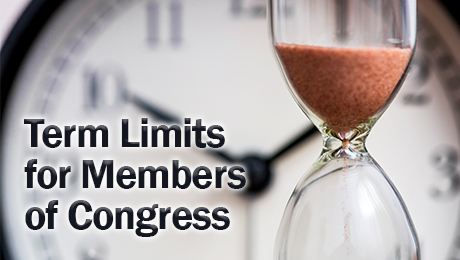
Five-in-Six Americans Favor Constitutional Amendment on Term Limits for Members of Congress
An in-depth study finds that five-in-six Americans favor a constitutional amendment to impose term limits on Members of Congress.
While there has not been a vote on term limits in Congress since 1995, the issue was given new life during this year’s speakership negotiations when Speaker McCarthy guaranteed a vote on congressional term limits.
The public consultation survey of 2700 registered voters was conducted by the Program for Public Consultation (PPC) at the University of Maryland’s School of Public Policy. Passing a constitutional amendment to establish term limits in Congress was favored by 83% of registered voters nationally, with little difference between partisans: 86% of Republicans, 80% of Democrats and 84% of independents.
Bipartisan support for this proposal has remained steady since PPC’s first public consultation survey on term limits in 2017, which found 80% in support.
To ensure that respondents understood the issue, they were first given a short briefing on the proposal and asked to evaluate arguments for and against. The content was reviewed by Congressional proponents and opponents of the legislation to ensure that the briefing was accurate and balanced and that the arguments presented were the strongest ones being made.
Respondents who favored the constitutional amendment were given the opportunity to specify the number of terms they prefer. Bipartisan majorities said four terms for House Members (60%, Republicans 64%, Democrats 54%) and two terms for Senators (63%, Republicans 69%, Democrats 56%). Another 17% said House Members should be limited to five or six terms, and another 16% said Senators should be limited to three or four terms.
“Bipartisan majorities of Americans continue to favor proposals to limit the terms of Members of Congress,” commented Steven Kull, director of PPC. “The overwhelming support for congressional term limits is also mirrored in the support for ballot measures to term limit state legislators in 16 states.”
The most popular argument in favor of term limits stated that incumbents have too much security in their seats, which reduces their need to be responsive to their constitutions (87% convincing, Republicans 90%, Democrats 84%). The con argument that did the best contended that term limits reduce the amount of experience in Congress, and cited research showing that they don’t increase responsiveness (50% convincing, Republicans 45%, Democrats 58%).
The sample was large enough to enable analysis of attitudes in very Republican and very Democratic districts based on Cook PVI ratings. In all cases, very large majorities in very red (86%) and very blue districts (78%) favored a constitutional amendment to establish term limits.
The survey was fielded Feb 1-14, 2023 online with a probability-based national sample of 2700 registered voters provided by Nielsen Scarborough from its larger sample, which is recruited by telephone and mail from a random sample of households. There is a margin of error of +/- 1.9%.
- Full Report (PDF): https://publicconsultation.org/wp-content/uploads/2023/03/Term-Limits-2023-Report-V2.pdf
- Questionnaire with Frequencies: https://publicconsultation.org/wp-content/uploads/2023/03/TermLimits_Quaire_0123.pdf
- Try the Policymaking Simulation:https://survey.alchemer.com/s3/7266932/Term-Limits-for-Members-of-Congress-2023


Be the first to comment